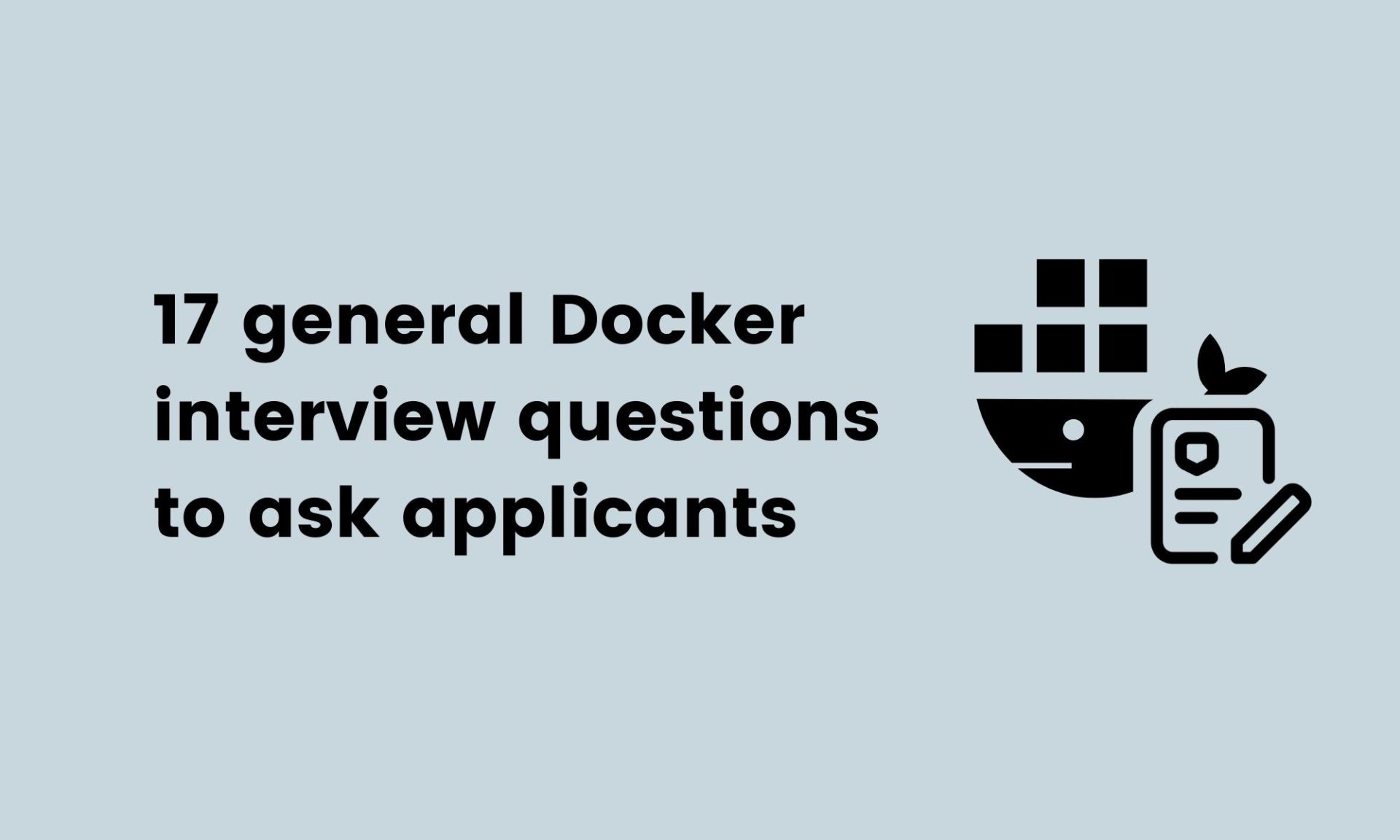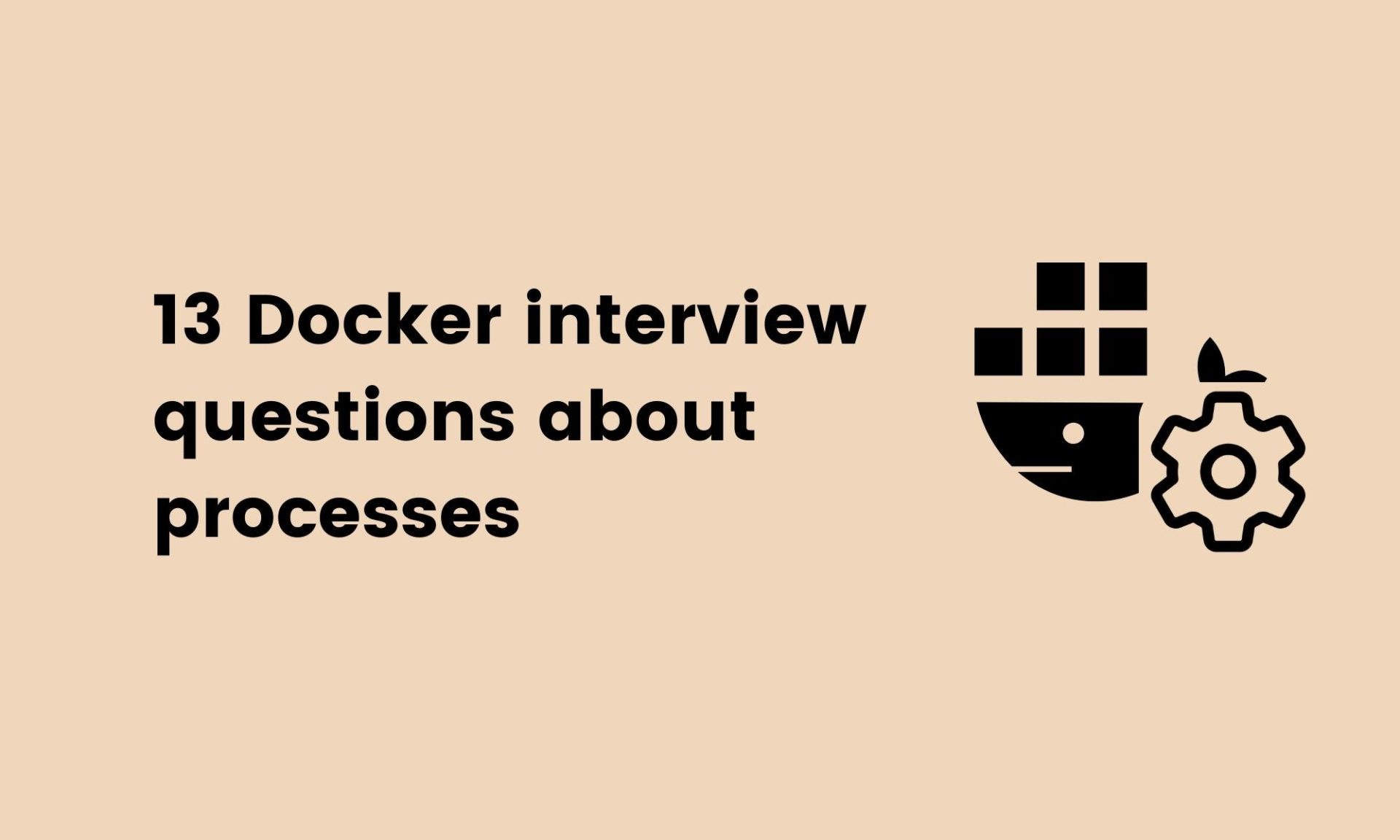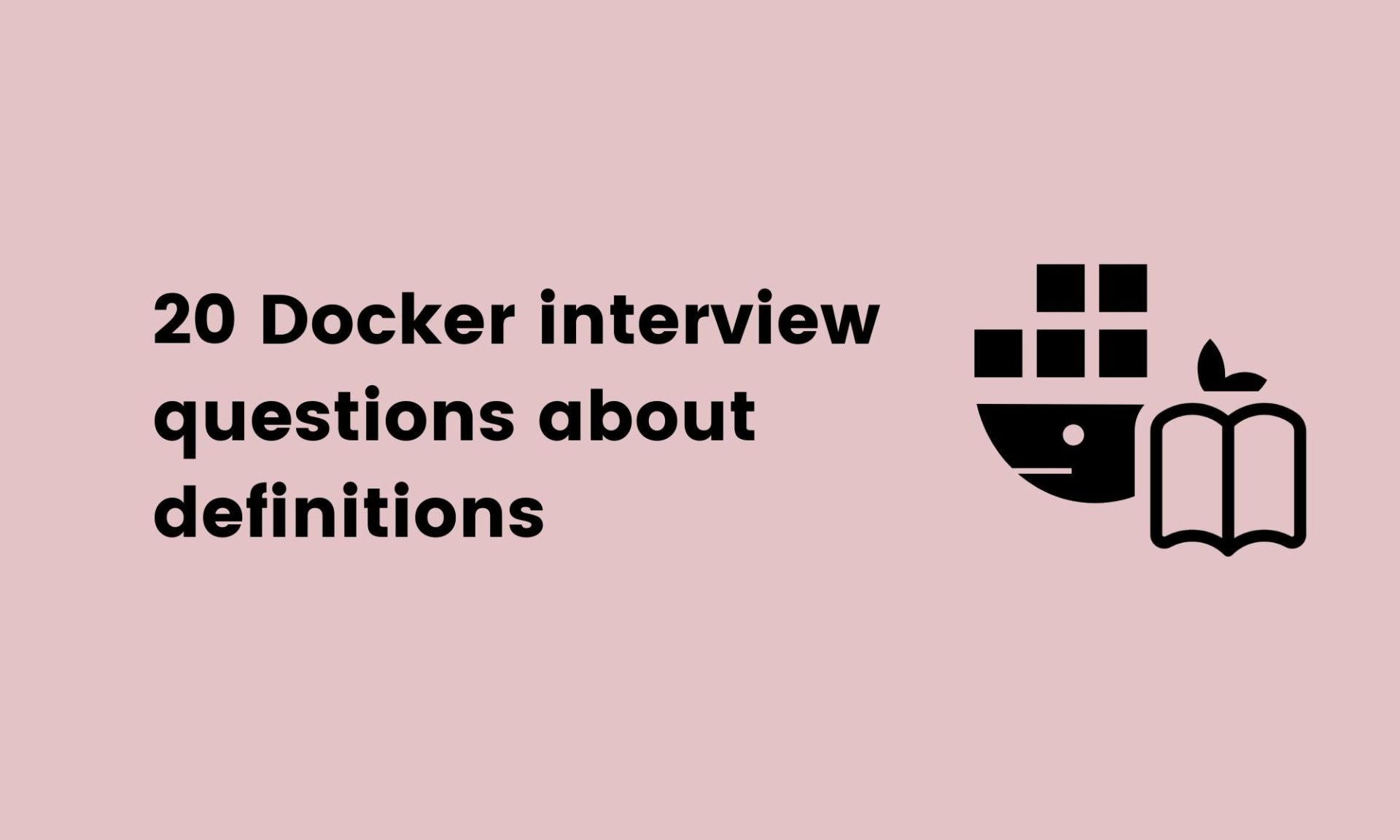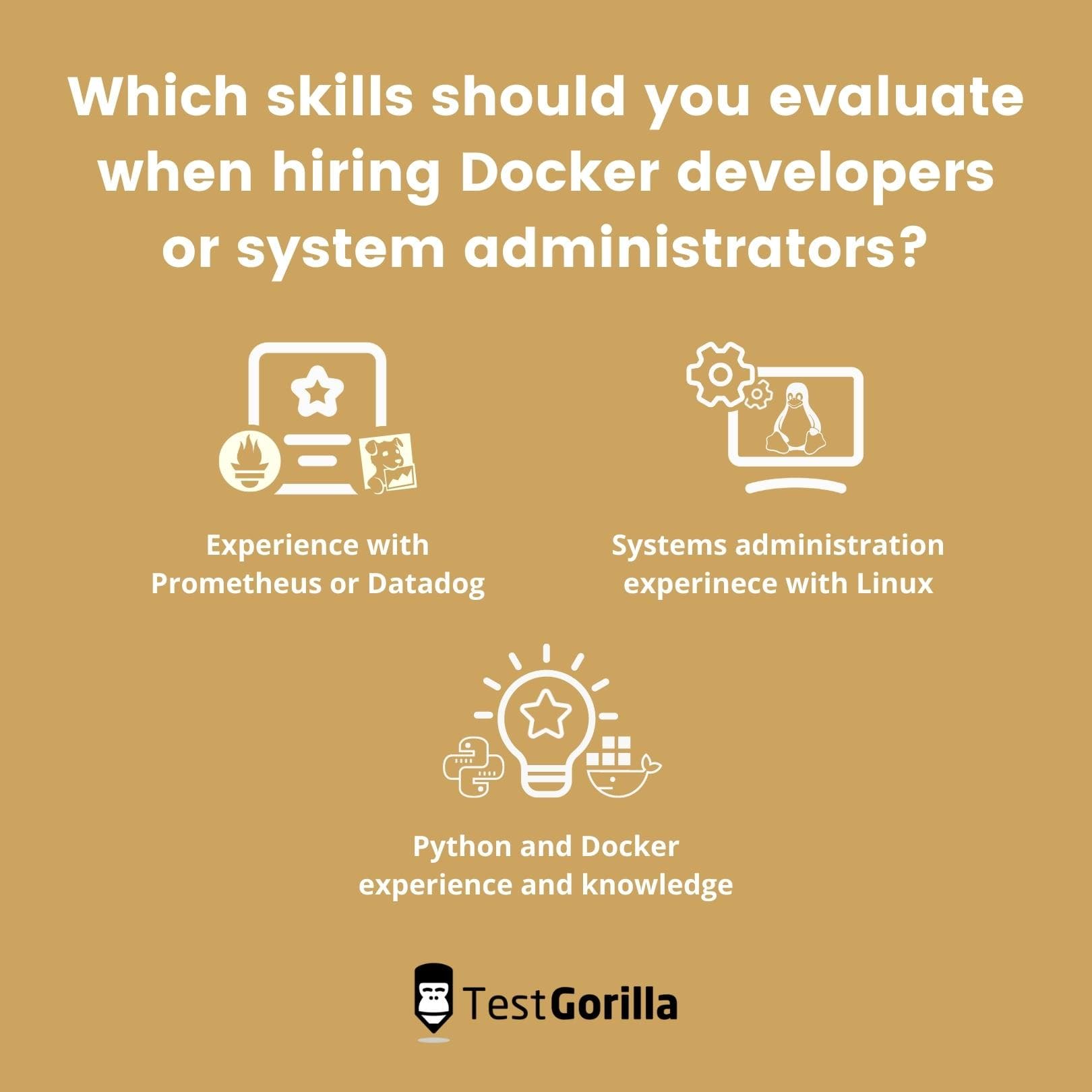If you want to hire the right system administrator or Docker developer, there are a few steps you need to go through.
Start with posting a job ad, sourcing candidates, and skills testing to evaluate your applicants’ skills. Next comes interviewing your most skilled applicants – and for this part, you need to prepare a comprehensive list of Docker interview questions.
Where can you get inspiration for your list of questions? The answer is: right here!
In this article, you’ll find 50 Docker interview questions to ask your applicants and find out more about their Docker skills. Plus, at the end of the article, you’ll find some extra tips on skills testing.
Table of contents
- 17 general Docker interview questions to ask applicants
- 5 general Docker interview questions and answers
- 13 Docker interview questions about processes
- 5 Docker interview questions and answers related to processes
- 20 Docker interview questions about definitions
- 5 Docker interview questions and answers related to definitions
- Which skills should you evaluate when hiring Docker developers or system administrators?
- At which stage of the recruitment process should you use skill testing?
- Which skill tests should you use to hire Docker developers?
- Find the best developer with skills tests and the right Docker interview questions
17 general Docker interview questions to ask applicants
Ask your applicants some of the following 17 general Docker interview questions to assess their overall general Docker knowledge.
Explain what a Docker container is.
Outline the three components that form the Docker architecture.
Explain what the Docker Registry is and what it does.
What is meant by the Docker Container lifecycle?
Outline the main stages of the Docker Container lifecycle.
Name and describe the crucial Docker commands.
Explain what a namespace is in Docker.
Explain what the Docker Swarm tool is.
Explain what the Docker Swarm tool does.
Outline the main functionalities of Docker.
Explain what Docker objects are.
Should you use stateful or stateless applications for Docker containers? Why?
What makes Docker unique compared to other containers?
Name the CPU architectures that Docker runs on.
Which skills do developers need to use Docker?
Which soft skills do developers need to use Docker?
Which skills have you learned in your current role to help you use Docker?
5 general Docker interview questions and answers
Here are the answers to five of the general Docker interview questions. Use these to gauge your applicants’ responses and knowledge.
1. Which skills do developers need to use Docker?
Candidates should know that Linux knowledge, as well as networking and security skills are all important for using Docker. Can your candidates show they have the required skills to use Docker efficiently?
2. Which skills have you learned in your current role to help you use Docker?
Your applicants will have developed many skills in their current roles. They might give examples of specific technical skills; some might also mention their mentoring experience or strong problem-solving skills.
Look for candidates who really want to keep progressing and learn new skills (whether they are technical, hard skills, or soft skills).
3. Outline the three components that form the Docker architecture.
The three main components that form the Docker architecture are:
Docker Registry: A component that stores Docker images
Docker Host: A component that holds the daemon, containers, and images
Docker Client: A component that runs operations and establishes communication with the host
4. Should you use stateful or stateless applications for Docker containers? Why?
Applicants should be aware that stateless applications are ideal for Docker containers since developers can make one container from the application and take out state parameters that are configurable. Developers can then run the same container with other environments and reuse the image in different scenarios. Stateless applications are also more scalable than stateful ones in terms of Docker containers.
5. Which soft skills do developers need to use Docker?
Some vital soft skills for Docker developers include communication, mentoring, and leadership skills, negotiation, and strong time-management skills.
13 Docker interview questions about processes
Ask your applicants some of the following 13 Docker interview questions about processes to assess their skills related to completing actions in Docker.
How would you identify a Docker Container’s status?
When would you use Dockerfile?
How would you complete a deployment process for Dockerized apps stored in a Git repository?
Which tools would you use to monitor Docker in production?
How would you run applications in a Linux Container using Docker?
What are the main tasks that developers can automate with container orchestration?
How do you log in to the Docker repository?
How would you scale Docker containers?
How would you run various compose file copies on the same host?
Which solution would you use to manage and store Docker images?
How would you check the Docker client and server version?
How would you create containers from an image?
How would you list containers that are running?
5 Docker interview questions and answers related to processes
Here are the sample answers of five of the Docker interview questions related to processes from the above list. Use them to evaluate your applicants’ responses and knowledge.
1. How would you complete a deployment process for Dockerized apps stored in a Git repository?
Applicants should know that the following steps can help them complete a deployment process for Dockerized apps stored in a Git repository:
Create an app using Docker build
Complete a test of an image
Perform a push of the new image to the Docker Registry
Ask the server to retrieve and run the image from the Docker Registry
Complete a port swapping process in HTTP proxy
End the old container
2. How would you run applications in a Linux container using Docker?
Your candidates should be able to outline the following steps for running applications in a Linux container using Docker:
Begin by installing and running Docker
Proceed to fetch the Linux-based OS Fedora 21 base image
Continue by loading the application in the base image
Then run the container with the new image in interactive mode
Check the system’s containers
Either stop or start the Docker container
Go into the container and then remove it (or remove the image)
3. How would you identify a Docker container’s status?
Are your candidates aware that there’s a command they can use to identify a Docker container’s status? They should know that docker ps-a will provide a list of every available Docker container and their status respective to the host.
4. What are the main tasks that developers can automate with container orchestration?
Your applicants should be able to list the following six tasks that can be automated with container orchestration:
Container provisioning and deployment
Resource allocation for each container
Load-balancing tasks
Container scaling tasks
Container allocation or switching to different hosts
Container and host health monitoring
5. How would you run various compose file copies on the same host?
Can your candidates explain that using docker-compose can help them run various compose file copies on the same host? Do they know that YAML files also help developers configure their app’s services?
The best applicants may know that to use docker-compose, they need to follow these steps:
Establish the app’s environment to facilitate replication
Establish the app’s services in the docker-compose.yml file
Run the docker-compose syntax to make and start the app
20 Docker interview questions about definitions
Ask your applicants the following 20 Docker interview questions about definitions to evaluate their knowledge of commands and actions in Docker.
Explain what the Docker run command does.
Which default networks are available in Docker?
Explain how the Docker run and Docker create commands are different.
Explain what the Docker version syntax is.
Explain what virtualization is.
How are repositories different from registries?
Explain what CMD instructions are.
Explain what ENTRYPOINT instructions are.
What is meant by containerization?
What is the purpose of containerization?
How is containerization different from virtualization?
Explain what the Docker exec syntax does.
Explain what the Docker build syntax does.
Explain what the Docker rm syntax does.
Explain what the Docker info syntax does.
Explain what the Docker cp syntax does.
Explain what bind mounts are.
Explain what volume mounts are.
Explain what tmpfs mounts are.
What is the Docker trusted registry?
5 Docker interview questions and answers related to definitions
Here are the answers to five of the Docker interview questions related to definitions from the above list. Use the responses to evaluate your candidates’ knowledge.
1. Explain what the Docker run command does.
Are your candidates aware that the docker run command is used to create running containers with locally stored images in Docker? Can they explain that this command enables containers to run commands inside the container?
2. Explain how the Docker run and Docker create commands are different.
Applicants should know the difference between Docker run and Docker create. Can they explain that the Docker create command creates a writeable container that has not been started, while the Docker run command will create the container and start it?
3. What is meant by containerization?
Do your candidates know that containerization refers to the many Docker containers that feature software packages such as code, libraries, system tools, and apps? Can they explain that containerization helps apps run smoothly?
4. How is containerization different from virtualization?
Candidates should know that virtualization enables developers to run various operating systems on one physical server. They should also know that containerization involves packaging applications as containers.
Explain what the Docker info syntax does.
Developers use the Docker info syntax to retrieve Docker-related information, such as:
Kernel version
Runtimes
Server version
Number of containers
Total memory
Which skills should you evaluate when hiring Docker developers or system administrators?
If you’re hiring Docker developers or system administrators for your team, assess whether your applicants have the following three essential skills.
1. Experience with Prometheus or Datadog
Candidates should have experience with Prometheus, which is an open-source monitoring toolkit for systems, or Datadog, a cloud monitoring software. Do your applicants have experience with these two tools?
2. Systems administration experience with Linux
Your applicants should have experience with the Linux operating system, as well as relevant system administration experience. How confidently can your candidates use Linux?
3. Python and Docker experience and knowledge
If your team is building applications in Python, your new hire might need to run Python code in Docker containers. Does your applicant understand how to run Python code in Docker? Do they know how to pack the code as a Docker image?
At which stage of the recruitment process should you use skill testing?
The best way to evaluate applicants’ skills is to integrate skill-testing into the early stages of your hiring process, ideally right after you source candidates, and instead of resume screening.
It’s counterproductive to interview applicants based on the skills they have listed in their resumes, since you have no way of knowing whether they actually have these skills.
Additionally, resume screening is slow, subjective, and biased: It could lead to disqualifying strong candidates, spending time interviewing the wrong applicants, or even to making costly hiring mistakes.
To avoid all this, we recommend using skills tests right after sourcing candidates: This way, you have an objective way to measure their skills and see if they match the requirements of your open role.
Select the best candidates based on results from the tests and invite them to an interview, to further evaluate their knowledge and experience.
Which skill tests should you use to hire Docker developers?
You can build a skills assessment of up to five tests. This enables you to evaluate different skills and get an in-depth understanding of applicants’ strengths.
When building your assessment, don’t forget to include the Docker test among your five tests.
With it, you can assess your applicants’ ability to deploy, configure, administer, and troubleshoot containers, and also evaluate their networking, security, configuration, and storage skills when working with Docker.
You may also consider using some of our soft skills tests, such as our Problem-Solving test and Time Management test, to ensure your applicants have all the skills you’re looking for.
Complement those with role-specific skills tests or programming tests for the best results.
Find the best developer with skills tests and the right Docker interview questions
At TestGorilla, we know that hiring the best developers can be a challenge, especially with the current talent shortages in the tech and IT industries. However, you can significantly improve and streamline your hiring process, if you have the right tools in your toolset: skills tests and a comprehensive list of Docker interview questions.
Always remember that skills testing is best done before interviews. This way, you can get accurate information on your candidates’ skills to help you select the right applicants to interview, and not waste time with applicants who simply don’t have the skills you need.
All that you’ll need to do after is to prepare for the interview stage by creating a list of Docker interview questions – and for this, you can use our list above and even incorporate some more tricky Docker interview questions.
Hire the best Docker developers and system administrators the easy way: Use skills tests and the right Docker interview questions.
Get started with TestGorilla for free today and start making better hiring decisions, faster and bias-free.
Related posts
Hire the best candidates with TestGorilla
Create pre-employment assessments in minutes to screen candidates, save time, and hire the best talent.
Latest posts
The best advice in pre-employment testing, in your inbox.
No spam. Unsubscribe at any time.

Hire the best. No bias. No stress.
Our screening tests identify the best candidates and make your hiring decisions faster, easier, and bias-free.
Free resources
This checklist covers key features you should look for when choosing a skills testing platform
This resource will help you develop an onboarding checklist for new hires.
How to assess your candidates' attention to detail.
Learn how to get human resources certified through HRCI or SHRM.
Learn how you can improve the level of talent at your company.
Learn how CapitalT reduced hiring bias with online skills assessments.
Learn how to make the resume process more efficient and more effective.
Improve your hiring strategy with these 7 critical recruitment metrics.
Learn how Sukhi decreased time spent reviewing resumes by 83%!
Hire more efficiently with these hacks that 99% of recruiters aren't using.
Make a business case for diversity and inclusion initiatives with this data.























